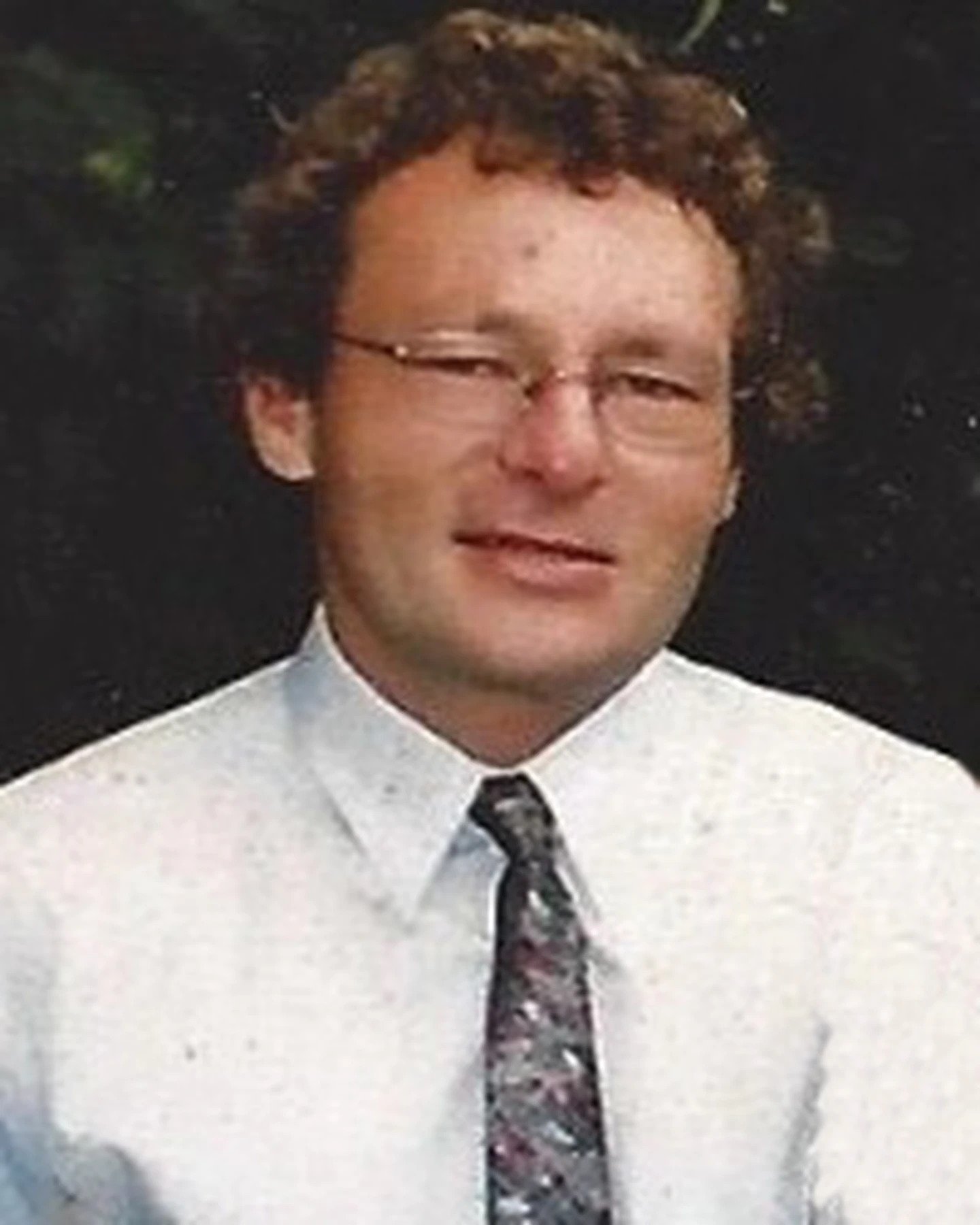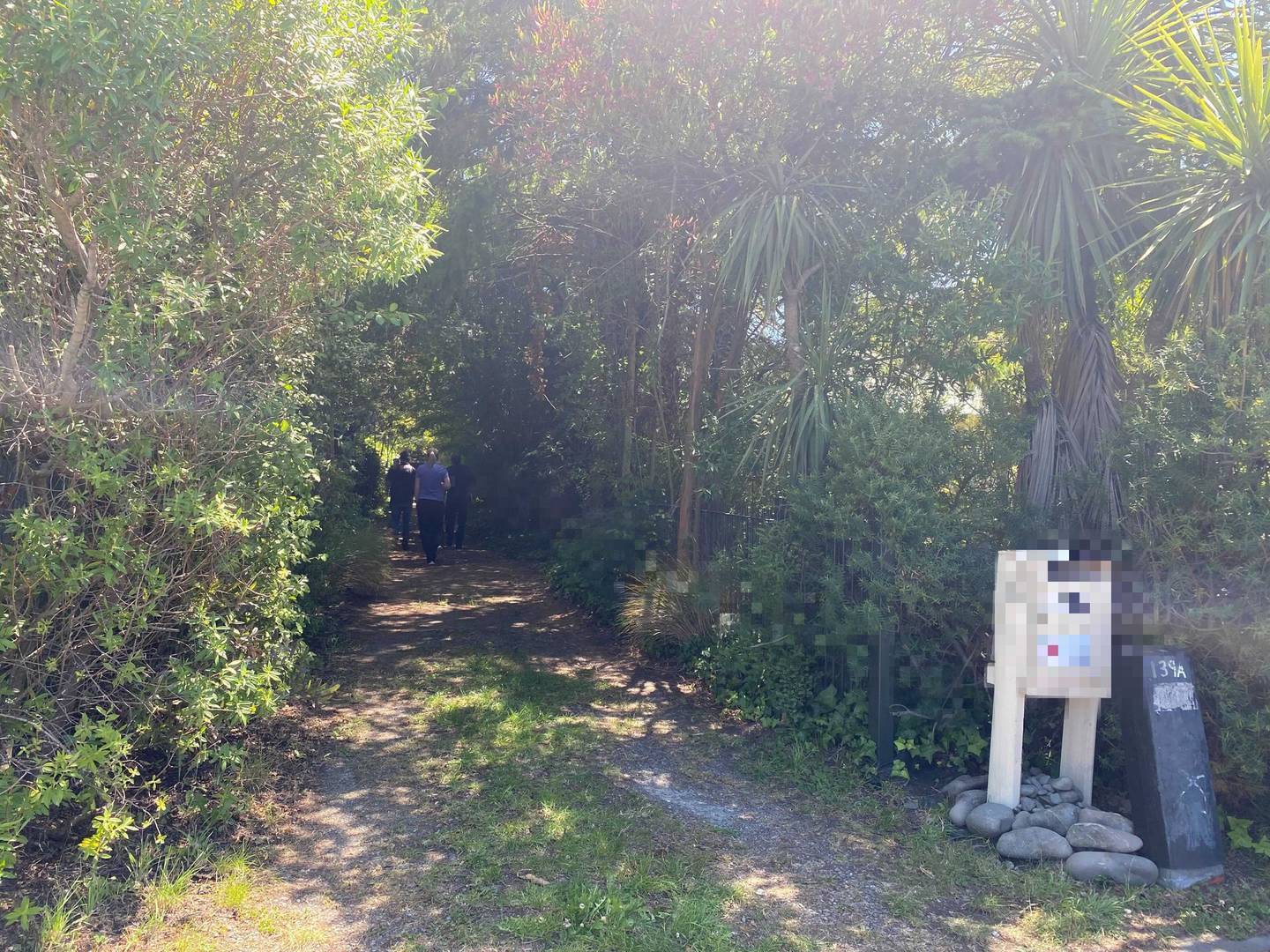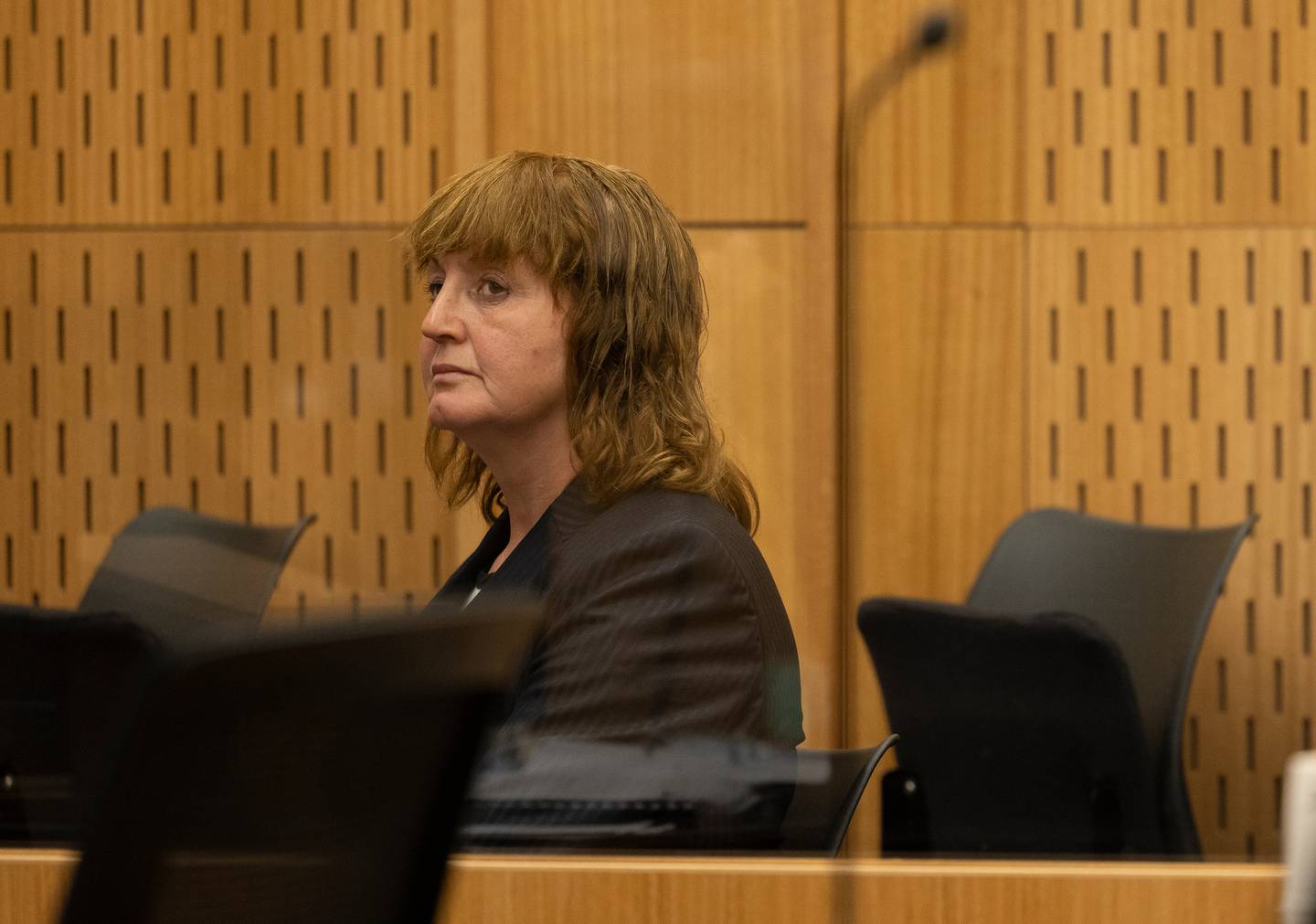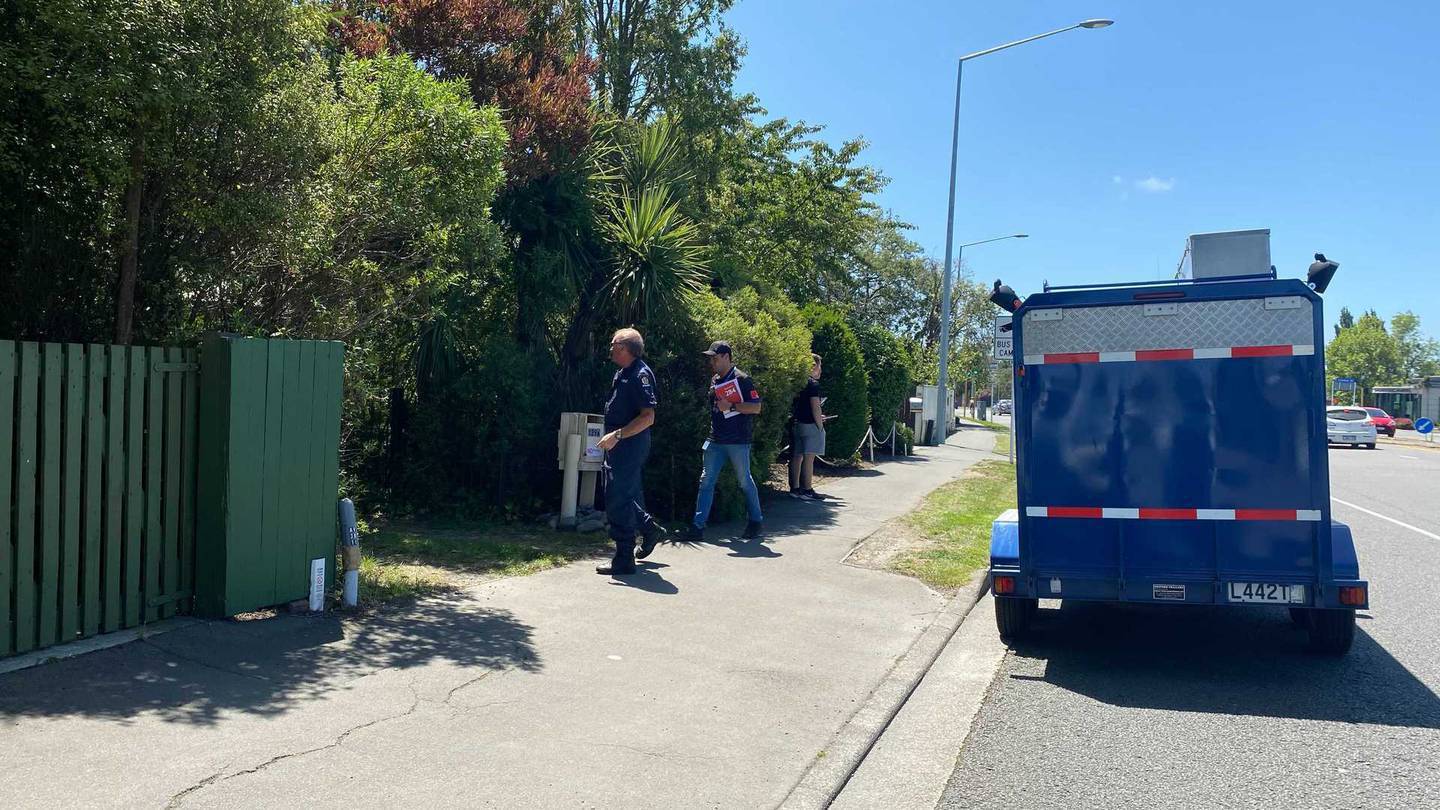Family speak about ‘horrendous’ death
[ad_1]
Today Rena Joyce was jailed for life for the murder of her partner Martin Berry.
In late December 2020 she attacked him with a kitchen knife – stabbing him repeatedly, cutting his throat.
She dragged his body out of his north Christchurch home and dumped him in a compost heap, barely covering him with vegetation and rotting food.
During her trial much was heard about the life and times of Joyce and her turbulent relationship with Berry.
But the jury also heard about the victim – a much-loved brother, uncle and friend who, despite an addiction to alcohol, had a brilliant mind and a kind heart.
Today his sister speaks for the first time to journalist Anna Leask about Martin Orme Berry, the real-life man behind the grisly murder.

Rena Joyce in court during her trial. Photo / Pool
The woman who murdered him made him out to be a monster – a brutal and aggressive alcoholic, a cruel and nasty bully, a mean and controlling man who tortured and terrorised her for years.
But for those who knew Martin Orme Berry, his murderer’s narrative was a vile fabrication.
No one in his inner circle will shy from the fact Berry was plagued by alcoholism – but they all vehemently maintain he was a good man, non-violent, thoughtful, gentle, kind and extremely loving.
His sister Joanna Statham gave evidence for the Crown about Berry’s life and death.
She also spoke to the Herald before today’s sentencing.
“He was our big brother, Uncle to his nieces and nephews, brother-in-law and son,” she said.
“He was funny, kind, quiet and he enjoyed a simple life.
“What Martin wasn’t always able to put into words he would show you through his actions and time he would spend with you.
“He was articulate, clever and kind.
“Martin was very witty and had a great sense of humour.”
Berry’s story began in Whanganui in 1965.
The oldest of Shirley and Joe Berry’s three children was quiet but highly intelligent and keen on nature and sport.
The family lived a few years in the UK but settled in Whanganui.
They had no other family in New Zealand so the three Berry children became close.
As a youngster, according to Statham, Berry was “passionate about a lot of things”.
“He was a real whizz mathematically, and he loved chess,” she said.
“He always loved insects and spiders and little creatures and was always trying to save them.”
Berry also loved all things gardening and, like his father, was voracious when it came to planting and tending.
Statham said her brother had an “amazing general knowledge” and was very interested in events around the globe.
“He would read newspapers whenever he could get hold of them and his nieces were always fascinated at how quickly he would complete sudoku puzzles,” she shared.
“When he was younger he loved playing soccer and he loved cricket as he got older too.”
One thing Berry did not master was making friends.
He was known to keep to himself and found it hard to form relationships.
But his gentle nature and love for those close to him was never in question.
Berry started his education at Tawhero School before moving through George’s Intermediate and Whanganui Collegiate.
When he left school he got a job at a bank – which was no surprise to his family.
“Numbers were his thing, so it made sense for him to go into the bank and work there,” Statham told the court during the trial.
“He enjoyed that because I think he enjoyed belonging to something and being part of something and being able to use his talents.”

Martin Berry. Photo / Supplied
Berry seemed to come out of his shell a bit, joining an indoor netball team and playing soccer and cricket with colleagues.
He also joined the company social club and started getting out more.
“He made friends,” Statham recalled fondly.
“He did have a group of friends that saw him through a lot of hard times later on.”
Those hard times came when Berry started to drink.
In the beginning, it wasn’t an issue – but over time it was clear he had a problem.
“When he started drinking I think it was because, at times, he was a little bit socially awkward,” his sister said.
“And [alcohol] probably gave him confidence. He hadn’t really grown up with many friendships so the drinking probably gave him that little bit of courage to be more social.
“But he eventually lost his job due to drinking – I don’t know the exact details but I imagine he was probably late and just found it hard to maintain a job.”
Berry’s drinking would take over his entire life.
“He was drinking quite a bit, Mum and Dad wanted to help him but he needed to be the one to decide to change things,” Statham said.
“I don’t know what triggered it but he came around to Mum and said ‘I really need help’.
“He had found a place or been advised of a place in Christchurch. In some ways, he needed a break from his group of friends in Whanganui… so quite courageously he got on a plane.”

Police arriving at the scene of the murder in Papanui, Christchurch. Photo / Anna Leask
Berry admitted himself to The Deanery, an alcohol rehabilitation centre.
His family said it “really did help him” and Berry was able to regain control of his life.
Eventually, he left the facility and went flatting in Christchurch. After the death of his father, his mother Shirley decided to sell her property in Whanganui and move south to be near him.
She purchased a house on Main North Rd in Papanui and Berry moved in with her.
“They lived together, helped each other out, shared the costs,” said Statham.
“It was company for them both, they could both really relate to each other.
“He loved it because [the house] had a garden; it wasn’t all set up but he could see the potential of what he could create.”
After a while, Berry was back on his feet and he wanted a bit more independence.
Statham and her husband had moved to Leeston and Shirley went to live with them.
Berry would bus out to see his family regularly and they in turn visited him in Papanui,
They would go to lunch and then he would take them back to the house to show off his latest garden projects and upgrades.
“He was very proud of it,” Statham remembered.
Berry still drank and still struggled at times but by and large he was doing well.
“He would have periods of abstinence and drinking over the years,” his brother David Berry said.
“Martin was not an ‘all or nothing’ alcoholic – he could have a drink or two if we went out.”
In 2006 Statham moved overseas and Shirley bought a flat on Blair Ave in Papanui, about 1km from her son’s place.

Rena Joyce, also known as Maloney, in court before her trial. Photo / Peter Meecham
“They could walk and meet up at the mall or go to each other’s houses,” Statham said.
“We just knew how much he enjoyed the connection – both of them did.
“He had my dad’s little dog, he took care of him, and they would meet up and go to the park.”
Life was going well for Berry, his sister felt, until he met Rena Joyce.
That meeting came over Christmas, 2017.
Berry flew home to Whanganui to spend the holiday with his brother David and his partner Pearl.
They went to a neighbourhood Christmas party and Joyce was a friend of the host.
It wasn’t long before Joyce was moving to Christchurch and into Berry’s home.
Joanna Statham said Joyce moving in was “quite sudden” – just six months after they met but her brother was “very excited”.
Berry’s siblings were concerned but he seemed happy so they supported him in his new relationship.
But that support quickly began to waiver.
Like Berry, Joyce also had issues with alcohol and from almost the beginning, their union was punctuated by arguing, fighting, abuse and violence.
“Initially I think it was all lovey-dovey and then I think reasonably quickly it deteriorated into violence – drunken violence,” David Berry told the court during the trial.
“He would tell me that she’d attacked him and this became a regular occurrence. I went down there and stayed and she attacked me one night, for no reason.
“Pretty much whenever she got drunk it would degrade into violence. She nearly bit his nose off once, she smashed a chair over him, she beat him, she smashed the telephone and hid phones so he couldn’t ring.
“Sometimes he said he’d just leave and walk the streets all night. He couldn’t go home for fear of further violence.”
David Berry said his older brother “didn’t know how” to leave his abusive partner.
“It was really bad,” said David Berry.
“I feared for his life – it was an incident away in my eyes.”
“We implored him to get away,” David Berry told the court.
“He couldn’t leave, he didn’t know how to get away from her.
“She just wouldn’t leave and he didn’t know what to do.”
Martin Berry would call his brother “covertly” to disclose what was going on.
He had to call in secret because Joyce “was always hovering” when he was able to use the phone.
“He was beaten up so bad once they called an ambulance,” said David Berry.
“She would throw things at him, she would chase him with household objects. She chased him with a knife several times.
“I think she would use anything that was available.”
Statham spoke with her brother at least once a month but that stopped almost completely when Joyce came on the scene.

Martin Berry was found dead at his Christchurch home. His partner was convicted of his murder. Photo / Anna Leask
Statham told the court during the trial that Joyce “was quite racist and verbally abusive” on at least one phone call.
She said “it was hard to get past what she said” and that resulted in fewer phone calls to Berry to avoid engaging with his partner.
Her last conversation with Berry is haunting.
“He told me he wanted to leave and buy a bit of land in Wanganui to get away from Rena,” Statham told the Herald.
“I wish he had let David and I help him to do this, then he would have been free from her.
“He could have been happy being home again in Wanganui with a big garden to potter in.”
Statham, who only met Joyce once, said her brother confided in her about the abuse a number of times.
“It was quite violent,” she said of the relationship.
“I knew he was scared, I knew he wanted to leave her but he didn’t know if he could.
“He was scared of Rena. He was trapped.
David Berry last saw his brother on December 29 2020 – just hours before Joyce murdered him.
He and Pearl were in Christchurch and they invited Berry and Joyce to lunch at an Indian restaurant.
“He looked really good. I had no reason to think anything untoward would happen,” said David Berry.
After Berry died it emerged that Joyce had a string of convictions for assaulting Berry and had spent time in prison as a result.
On one occasion Berry called police and said Joyce had attacked him and “had a knife”.
Another time she “told him she would kill him if he rang police again”.
The Courts granted Berry a protection order against Joyce but that did not keep them apart.

Martin Orme Berry was murdered at his Christchurch home. Photo / Supplied
Soon after, police attended a callout to the house and found Berry with his T-shirt “ripped and hanging off him”, bloodied tissues nearby, broken plates and smashed glass from
the oven door.
That day, Berry told police he did not want to make a complaint but “wanted her out of the house”.
Berry was also convicted of assaulting Joyce on one occasion.
He pleaded guilty, admitting he punched her but that “it was in self-defence”.
Berry was open about the conviction with his brother.
“She’d attacked him and he just couldn’t do anything to get away from her,” David Berry recalled.
“He was just in a corner and lost it and hit her, hit her once in the face and I think she got a couple of black eyes.”
He said he had never seen his brother hit another person in his life and he was known to be a gentle person.
“Martin was not the sort of person who would hurt a fly,” David Berry said.
“I’ve never seen Martin hut anyone or be offensive towards anyone.”
Statham said it was “impossible” to put into words the impact her brother’s “horrendous” murder has had on the family.
“Martin’s horrific death is the most distressing thing that has ever happened to our small family,” she told the Herald.
“Life has changed and will never go back to what it was before.
“The heavy feelings of sadness are present daily and the images we have in our heads of his final seconds are ever-present.
“The cruel way that Martin was murdered along with finding his belongings missing from his house was a double shock.”
Statham said Joyce “denied Martin any dignity he may have had left by leaving him to rot in the garden”.
“She denied us our last farewells with Martin by being able to see his body before he was cremated,” she said.
“The funeral director asked if we had any items of his clothing to lay over his body bag – but she had got rid of everything, there was nothing left.
“Anything she couldn’t remove from his house, she broke and threw over the fence.
“All we have left to remember Martin by were the bloodstains left on the lounge floor and initially the faint smell of where his decomposing body had lain in the garden.”
“No family should ever be left with this,” she said.
“Rena murdered the only person who ever really loved her, she will have to live with that realisation forever.
“Her time in jail is a mere formality, the real jail for her is replaying in her head how she took his life so cruelly – how she destroyed any chance of happiness with someone who actually saw her, understood her and her brokenness and loved her all the more for it.
“Every day she will have to wake up and remember she brutally stole a life from a kind and humble person.
“Our only hope is that one day she will understand how senseless it all was.”
Statham said Berry would “forever be our big brother”.
“He will always be remembered and loved and he can be hurt no more now,” she said.
“David and I loved Martin so much and we know that he knew it.
“Nothing else matters in the end.”
DO YOU NEED HELP?
If you’re in danger now:
• Phone the police on 111 or ask neighbours of friends to ring for you.
• Run outside and head for where there are other people.
• Scream for help so that your neighbours can hear you.
• Take the children with you.
• Don’t stop to get anything else.
• If you are being abused, remember it’s not your fault. Violence is never okay
Where to go for help or more information:
• Shine, free national helpline with both male and female counsellors, 9am–11pm every day – 0508 744 633 www.2shine.org.nz
• Women’s Refuge: Free national crisis line operates 24/7 – 0800 refuge or 0800 733 843 www.womensrefuge.org.nz
• Shakti: Providing specialist cultural services for African, Asian and middle eastern women and their children. Crisis line 24/7 0800 742 584
• It’s Not Ok: Information line 0800 456 450 www.areyouok.org.nz
[ad_2]
Source link
